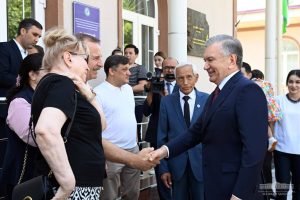As Uzbekistan returned to the ballot boxes on July 9, President Shavkat Mirziyoyev was expected to win yet another landslide victory. As predicted, he secured himself another victory, with 87 percent of votes. These elections have given the incumbent the opportunity to hold power until 2037.
Three years ago, referring to Mirziyoyev’s ascent to power, a member of the Central Electoral Commission, Gulnoza Ismailova, stated: “Today, Uzbekistan is a country that has turned into a dynamically developing democratic and legal society. The election of the President of Uzbekistan Shavkat Mirziyoyev gave a new impetus to the large-scale reforms in many spheres of our life.”
Indeed, “dynamic” appears frequently in web searches about Uzbekistan these days, as the state seems to aim for branding Uzbekistan as dynamic. There was a magazine to promote the country called “Dynamic Uzbekistan.” There was a promotional YouTube video from the Ministry of Foreign Affairs awkwardly bragging about the “dynamicness” of Uzbekistan’s location, history, culture, natural resources, economic growth, and its education sector. There are notes in foreign media about the “dynamic” cooperation Uzbekistan has with its neighbors. The Investment and Promotion Agency under the Uzbekistani Ministry of Investments and Foreign Trade also brands the country’s economic reforms as “dynamic.”
However, the buzzword really begins to lose its meaning once one reads in the state-commissioned ESG (environmental, social, and governance) report, written by international PR firms, that the media environment in Uzbekistan has seen a “notably dynamic development.”
Shahida Salomova is a 60-year old blogger who is known for her outspoken criticism of local authorities and officials on her YouTube channel. But in December last year, she stepped too far for the “dynamic” Uzbek media environment. First, she accused the president and his family of nepotism and corruption, and the next day she posted about the alleged extramarital activities of the president’s son-in-law. She was arrested and ended up in a psychiatric hospital. To date, there is no news about Salomova’s state of health or exact whereabouts.
This year has also seen a “dynamic” tightening of screws on many other bloggers’ thumbs, as it appears that anyone criticizing the authorities could face prosecution or even time behind bars. Another blogger, Otabek Kodirov (also known as Kholid Kodir), was arrested in May on charges of incitement to hatred and insult of the president, after he compared Uzbekistan to a dictatorship and criticized the state for corruption and nepotism. Blogger Elmurod Odilov was also arrested in May, after filming a meeting between a deputy regional head and silk farmers. Blogger Abdukadyr Muminov was arrested for blackmail and extortion in February. Muminov’s supporters believe the charges are a retaliation for his public criticism of the authorities. The list goes on.
Such practices go against the president’s own pledges. In December 2020, Mirziyoyev said, “Of course, many local officials do not like sharp and critical materials, [which] violate their calm and carefree existence. But publicity and freedom of speech is the requirement of the time, the requirement of reforms in Uzbekistan.”
The silencing of bloggers was exacerbated by the lack of any real element of competition in the July 9 elections. This is a point that the Organization for Security and Cooperation in Europe and its Office for Democratic Institutions and Human Rights (OSCE/ODIHR) have repeatedly criticized, particularly the lack of genuine competition and pluralism. And pluralism is especially challenged by the systematic and prolonged obstruction of the opposition. This is something that IPHR highlighted prior to the presidential elections in 2021, when authorities harassed and intimidated opposition activists Khidirnazar Allakulov (Haqiqat va Taraqqiyot), Mahmud Davronov (Ozod Vatan), Jahongir Otajonov (Erk) and others. Otajonov quit the election race in 2021, after being attacked by unknown individuals. This year, there were no serious challengers to Mirziyoyev’s candidacy.
According to the ESG report, which Uzbekistan’s Export Promotion Agency commissioned, “Uzbekistan is determined to keep moving forward.”
But surely freedom of expression should be one of the key components of this future, truly dynamic Uzbekistan? It would behoove the authorities to allow and promote real changes in line with human rights instead of repeating hollow phrases.

































